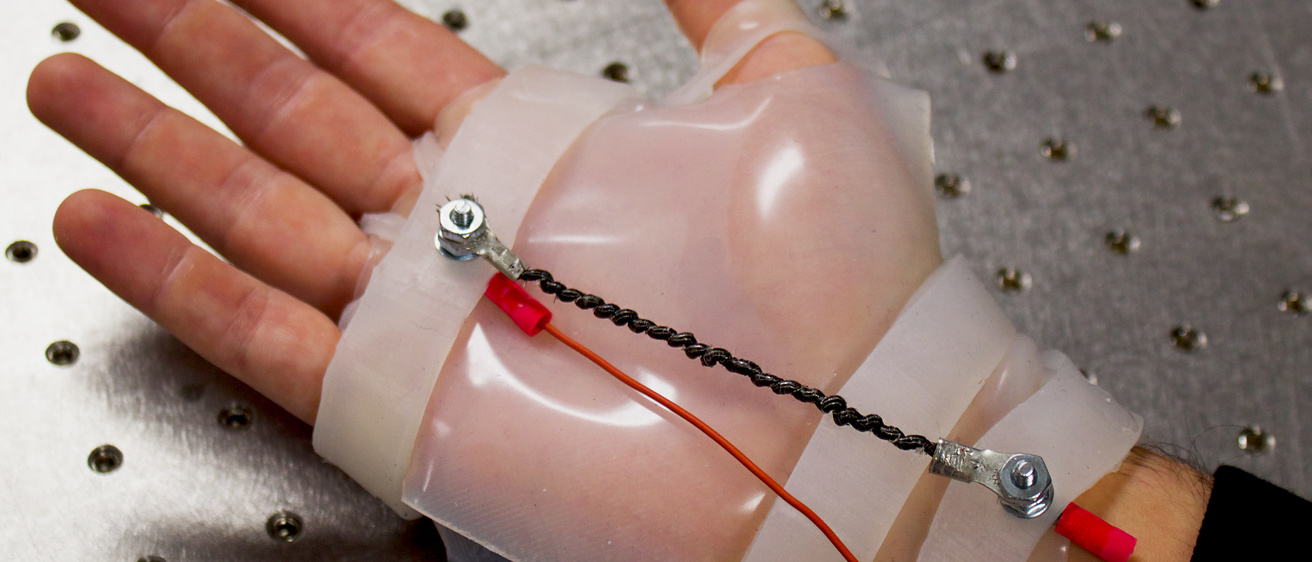Collaborating at a crossroads of their engineering focuses, the Cooperative Autonomous Systems (CAS) Laboratory and the Smart Multifunctional Material Systems (SMMS) Laboratory at the University of Iowa are working on a new project: the creation of a lightweight, mobile, and low-cost orthotic robotic rehabilitation device. The CAS Lab houses research from Venanzio Cichella, and the SMMS Lab houses research from Caterina Lamuta, both assistant professors in the Department of Mechanical Engineering at the UI. The device has applications in physical rehabilitation, use for people with disabilities, and potentially in general labor with strenuous repetitive motion.
The device is fitted onto the wrist and hand, currently featuring a silicone rubber glove with bands of artificial muscles placed on either side. The artificial muscles used can be produced for less than one cent and require an extremely low electrical input to function (0.02 V/cm). The size and strength of these artificial muscles enable them to reproduce casual human motion and, in later models, look to activate all joints in the upper limbs, from shoulder to fingertips.
The CAS Lab conducts experimental testing of control algorithms, usually on autonomous vehicles. In this project, the lab’s expertise provides vital input concerning the technical capabilities of the device, particularly in control algorithms that enable the device to execute desired tasks while adhering to human motion principles.
The device requires the monitoring of voltages at extremely specific intervals to function smoothly. CAS Lab developed a dynamic model to understand how much to contract a muscle to obtain a specific angle or extension. Then, the device’s voltage is measured at all ranges of its motion using a Vicon Motion Capture System, able to obtain sub-millimeter accuracy on the movement of the test hand.
“My group has been working on the aspects of control theory: computational efficiency, robustness, and so on,” said Cichella. “We are addressing the theoretical issues with these muscles and are now at the point of joining forces and implementing these algorithms on the device.”
The SMMS Laboratory works in the field of smart multifunctional material systems, researching and producing small, lightweight materials to be used in medical devices, robotics, sensing, and energy harvesting. The SMMS Lab produced the artificial muscles used in the device: carbon fibers embedded into silicone rubber, twisted until reaching the point of spontaneous coiling. The result is a flexible spring in a helical shape, able to lift up to 12,600 times its own weight.
“When we made this artificial muscle and found promising results in terms of strength-weight ratio, we realized it could be very promising for use in the medical field,” said Lamuta.
At its current stage of development, the device is powered by a battery wired a few feet away. Future models expect to implement batteries or power supplies small enough to be carried on a person, a far cry from bulky, noisy orthotic devices available for use today.
To gain insight on the medical applications and specifications of the device, the project has received key input and guidance from Jason Wilken, an associate professor of physical therapy and rehabilitation at the UI.
“Dr. Wilken is helping us understand how skeletal muscle works in general and he is an expert in the design of orthotic devices,” said Lamuta. “He’s familiar with the limitations of current devices and knows what patients want and need from future devices.”
Multiple PhD students are also working on the project. Calvin Kielas-Jensen is a PhD student working at CAS Lab and has been helping with the physical setup of the device, interfacing it with the computers used to track progress, and ultimately collecting the data produced.
Carlo Greco, a visiting scholar from Italy working at SMMS Lab, has helped with the design of the artificial muscles and the device in general, and wrote first copy of the research paper. Thilina Weerakkody, a first-year UI PhD student from Sri Lanka, has worked in the engineering of prosthetics before coming to Iowa to work with SMMS Lab. In this project, Weerakkody has worked on the testing and connection of the device to its controller.
“What is so exciting about this project is that we have gained interest from professionals in different fields, like radiology and dentistry, that may be able to use our expertise to help in their work,” said Cichella. “It is very moving to know that our work and research can help people in their everyday lives.”
